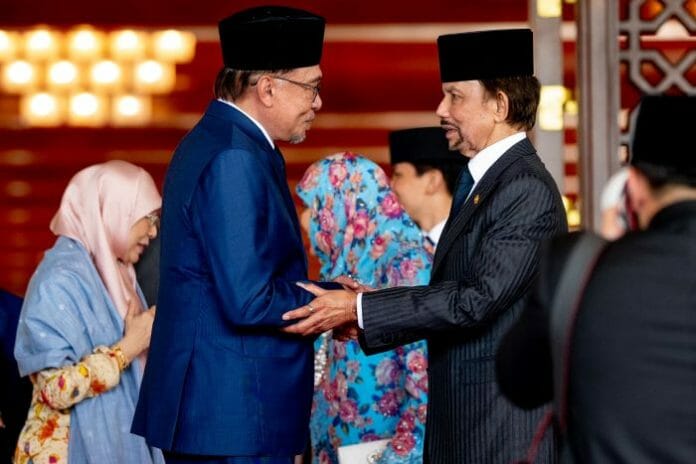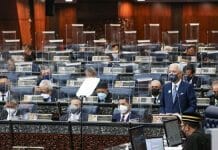Prime Minister Datuk Seri Anwar Ibrahim’s recent visit to Brunei underscored the strategic importance of both countries to one another, especially in the field of high politics and security spectrum. Historically, culturally and socio-economically, both players have been traditional partners and similarly to Indonesia, have formed the axis of shared roots and affiliations that have provided progressive and justifiable tools and shared interests in preserving the sanctity and long-term resilience of these ties.
The visit, as also portrayed in the recent Indonesia visit, has largely focused on common collaborative ventures and integration in low politics including tourism, education, economic empowerment and people-to-people ties.
Brunei-Malaysia ties have vast untapped potential and benefits that will provide greater returns under the umbrella of high politics and joint commitment in common defence and security.
In ensuring Brunei’s long-term security needs and in facing renewed vulnerabilities and uncertainties in the regional security landscape, Malaysia remains its closest and most crucial partner in bolstering heightened responsive and deterrence capacity.
Both in capitalising on shared fears and anxieties, particularly on the dispute in the South China Sea and the threat to the crucial oil and gas resources to both countries, but significantly more integral and important to Brunei, the combined assurance and weight of support will form a greater level of ripple and spillover effects to other areas of low politics.
In determining the immediate and near-term priorities for Brunei, the crucial economic reform needed in pivoting away from the oil and gas-reliant economic setting will need strategic leverage on Malaysia’s same path of economic reorientation. The transition towards a digital and knowledge economy based on the high-impact value chain of critical sectors and technologies including green and renewable energy, the chips and semiconductor industry, artificial intelligence and digital-led innovation, high-impact scientific assets including space and quantum technologies from the foundational push towards the leap. Both countries need the pushing tools and factors in propelling the new shifts and transitions, away from the conventional decades-old fixed reliance on natural fossil fuel assets in sustaining their economies.
In this regard, Brunei is acutely aware of the changing geopolitical parameters at play, as can be seen in the fierce competition for supremacy in the technological sector, resources and security-related assets that will prove fundamental in the new global competition and rivalry.
Brunei’s construct and imagination of maritime security and its security priorities are driven heavily by developments taking place within the country’s immediate periphery.
The major risks facing Brunei’s economy are mainly from domestic factors because of its high reliance on the oil and gas sector. Notwithstanding the fact that the government has enhanced its effort to develop other industries, the role and level of the oil and gas sector in GDP growth, exports, and fiscal revenue remain high. An unexpectedly large shortfall in oil and LNG production in the past has affected economic growth, and so did headwinds in the volatility of oil prices.
Policy efforts on structural reforms and to diversify the economy away from the oil and gas sector into manufacturing, tourism, agriculture, aquaculture and other non-traditional industries will be projected to be the main focus of Brunei’s economic transformation. All these will need the right and strategic capitalisation on Malaysia’s parallel focus and shift in these new ventures and transformations and will remain the core cooperation fundamentals between the two countries. should be continued to enhance Brunei Darussalam’s long-term growth prospects.
The strong personal bond between both PM Anwar and Sultan Hassanal Bolkiah has also enabled direct and superseding factors in cementing core trust-building efforts and bypassing lower-level frictions and stumbling blocks.
ASEAN remains one of the most important regional platforms for both countries, in deriving economic and peace dividends. For Brunei especially, its exposed geopolitical risks and security settings have compelled it to rely on ASEAN and its various conflict prevention mechanisms to strengthen its defensive and deterrence capacity in a collective setting. Diplomacy and dialogue-building measures will remain the prime dependence, and Brunei will also capitalise on strengthening its Islamic leadership and credentials in building deeper linkages and returns from other powerful Islamic peers that will contribute to building a pool of combined strength in resource and supply chain resilience.
Greater synergy and integration of joint efforts for shared interests involving the tripartite strength of Indonesia, Malaysia and Brunei will be among the most important fundamentals, elevating the importance of shared roots, trust and understanding and in capitalising on shared concerns and strength. This includes the capitalisation on the upcoming potential and openings for Indonesia’s new capital, the Nusantara, which will propel the progressive potential of Borneo as a whole that will benefit the three countries on many fronts.
Increased intensity in security and deterrence measures in the South China Sea especially in disputed territories, will need to depend on expanded boost and support from a similar joint front, in capitalising on the tripartite joint arrangement and security cooperation in this spectrum.
The 2021 Defence White Paper of Brunei shows a drastic shift in perspective, according to greater strategic importance to Brunei’s maritime domain in light of increasing security risks and vulnerabilities. It identifies increasing risks surrounding overlapping claims and emerging threats to the safety of sea lines, communication and trade routes.
The risk of miscalculation and the ensuing spiralling of regional instability is a concern spelt out as the “most significant threat” in the maritime domain. This urgency is also reflected in domestic efforts to reassess Brunei’s strategic posture and conduct a Force Capability Review. It still reflects the growing concerns and anxieties of Brunei in facing the traditional threats alone, with less reliable capacity.
Brunei is in a precarious and exposed position as a claimant state to the South China Sea dispute, owing to its limited geographical advantage and size and in its level of deterrence capacities.
As the security landscape in the South China Sea continues to rapidly evolve, Brunei’s maritime and defence agencies are treading carefully on adapting to the new risks and needs without inciting retaliatory perceptions and threats from other regional powerhouses. It will need to assiduously craft-wise yet strategic calculations moving forward, and Malaysia and Indonesia will remain on the periphery of crucial geopolitical support fronts for Brunei. For now, economic and security calculations remain of the utmost significance for Brunei and are reflected in the central lining of Brunei-Malaysia ties.
By Collin Ching Yew Keat-Univerity Of Malaya









